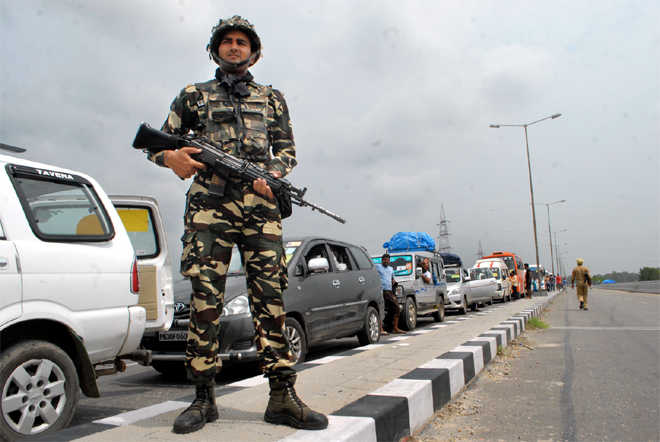- J-K truce might hold longer than expected



Pravin Sawhney Editor, FORCE
Inter-Services Public Relations DG Asif Ghafoor’s offer of the Pak army’s willingness to engage with India in talks could open up vast avenues for peace in the subcontinent.
The conditional ceasefire announced by the Central government in Jammu and Kashmir during the month of Ramzan should hold longer than expected by most. Not because the Modi government has had a change of heart on its Kashmir policy, but because the Pakistan army is likely to give enough time to the international community (the US, China and Russia) to persuade India to move towards conflict resolution, however, slowly.
Interestingly, the director-general of Pakistan's Inter-Services Public Relations Directorate, Maj-Gen Asif Ghafoor, while recently interacting with visiting Indian journalists, said the Pakistan army is willing to join its civilian leadership in talks with India. This development, a first, could open up vast avenues for peace in the subcontinent.
For one, the bilateral talks, if they happen, would not get hampered by Pakistan's impending general election or the existing political upheaval there or the possibility of misrepresentation of Pakistan's viewpoint by its civilian leadership. For another, the Indian ceasefire and concomitant positivity from the Pakistan army to enter direct talks would open up an entirely new phase in the bilateral relationship: from Confidence Building Measures (CBMs) which have failed to bring peace, to conflict resolution, including military CBMs which hold enormous promise to eventually tackle the most difficult issue about the future of Kashmir.
Ghafoor's sensational offer followed his army chief, Gen Qamar Javed Bajwa's call to seek a resolution of all disputes with India, including J&K, by peaceful means. The Pakistan army has been trying since 2009 to open direct talks with India. In 2009, quite unexpectedly, the ISI chief, Lt-Gen Shuja Pasha, attended the Iftar party given by the Indian High Commission in Islamabad. There he met India's defence attaché and floated the idea of having parallel talks with the Pakistan army alongside the civil dispensation. The idea did not go far.
Moreover, the 'comprehensive bilateral dialogue' format agreed to by the Modi government in December 2015 was unprecedented, in that the Pakistan army had its way while allowing India to save face. After the fiasco over the Ufa statement where India had insisted that only terrorism would be discussed by the two NSAs, on October 22, 2015, Rawalpindi replaced Pakistan's civilian NSA, Nawaz Sharif's appointee Sartaj Aziz, with the recently retired Lt-Gen Nasser Khan Janjua, considered close to the army chief, Gen Raheel Sharif. Therefore, while India had its way of holding talks between the NSAs in Bangkok, for the first time it was talking with the Pakistan army.
With a civilian government in Islamabad, India had difficulty in talking with the Pakistan army for a number of reasons. The Pakistan army is seen as the enemy directly responsible for the proxy war in Kashmir. India prides itself as a democracy; hence, with an elected government in Islamabad, direct talks with the army would not be in order. Also, India would not like to set a precedent by holding high-level government talks with the Pakistan army, fearing that with time, the Indian military — which is outside the security policymaking loop — would want to be inside it. Finally, Indian diplomats do not like the idea of sharing their exclusive space with military officers; notwithstanding the fact that the present warfare has complex nuances which the diplomats are ignorant about.
Despite India's politically correct arguments for talking with Islamabad and not Army Headquarters in Rawalpindi at the same time, the truth is that results will only accrue when the real power centre in Pakistan is addressed directly. This is how Pakistan works and India can do little about it. For example, years of structured bilateral talks under the rubric of Composite Dialogue with Islamabad have never moved beyond confidence building measures. The CBMs, by definition, are as good as the political will available on the two sides. When a civilian government in Pakistan talks peace with India, it has to look over its shoulders for its army's nod.
There is a bigger problem. The BJP's ideological mentor, the RSS, maintains that unification of India, Pakistan, Bangladesh and Afghanistan, without the use of force, is possible. Unlike Vajpayee, who spoke in generalities, Prime Minister Narendra Modi is a hardcore rightist, so there is little possibility of his government talking about the Kashmir resolution which would usher in permanent peace and stability. True to his ideology, Modi, while reviewing the unrest in Kashmir following the killing of Hizbul commander Burhan Wani in July 2016, made it clear that India would only talk about the return of PoK and Gilgit-Baltistan with Pakistan.
Notwithstanding all this, there is still a way forward. The two sides could talk security-related issues under the February 1999 Lahore Declaration's memorandum of understanding. Instead of the strategic restrain regime suggested by the Pakistan army after the 1998 nuclear tests, the two sides could start with humble beginnings. A review of impending defence technologies which are expected to alter the strategic and operational (war-fighting) balance, to include space, cyber and sea-based deterrence, would be of interest to the Pakistan army. India's argument that it would not discuss defence issues with Pakistan is no longer valid after the Pakistan and Chinese military have developed credible inter-operability (ability to fight together).
Moreover, since the US, Russia and China have their own interests in securing peace between India and Pakistan, they would impress upon India to take the correct path to end unnecessary bloodshed on both sides. Perhaps, a beginning could be made at the coming SCO military exercise which would see the armies of India, Pakistan, Russia and China exercising together.
Courtesy: Tribune: May 18, 2018


